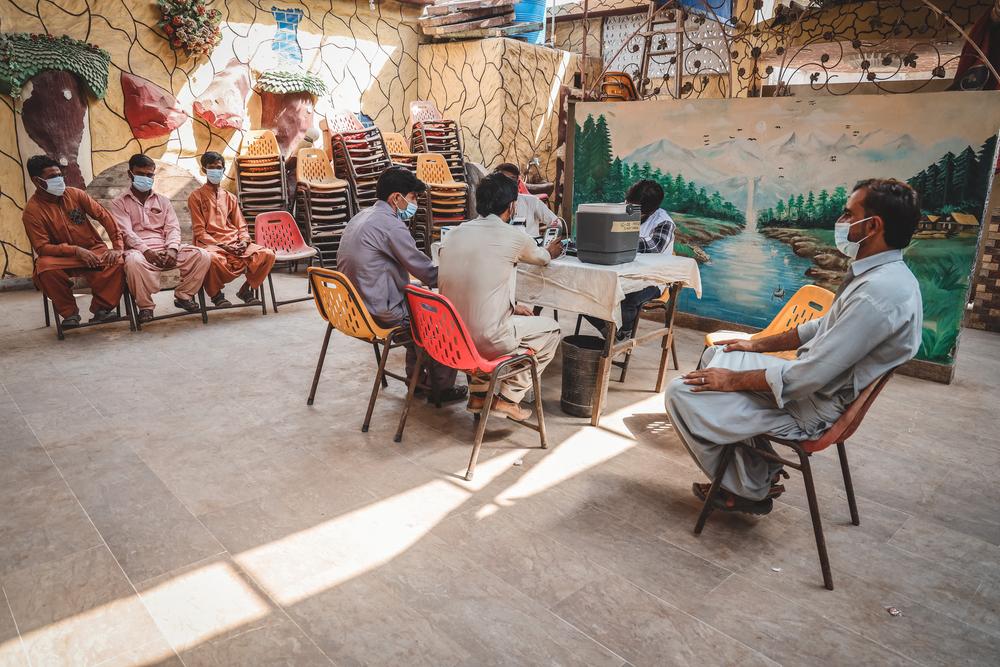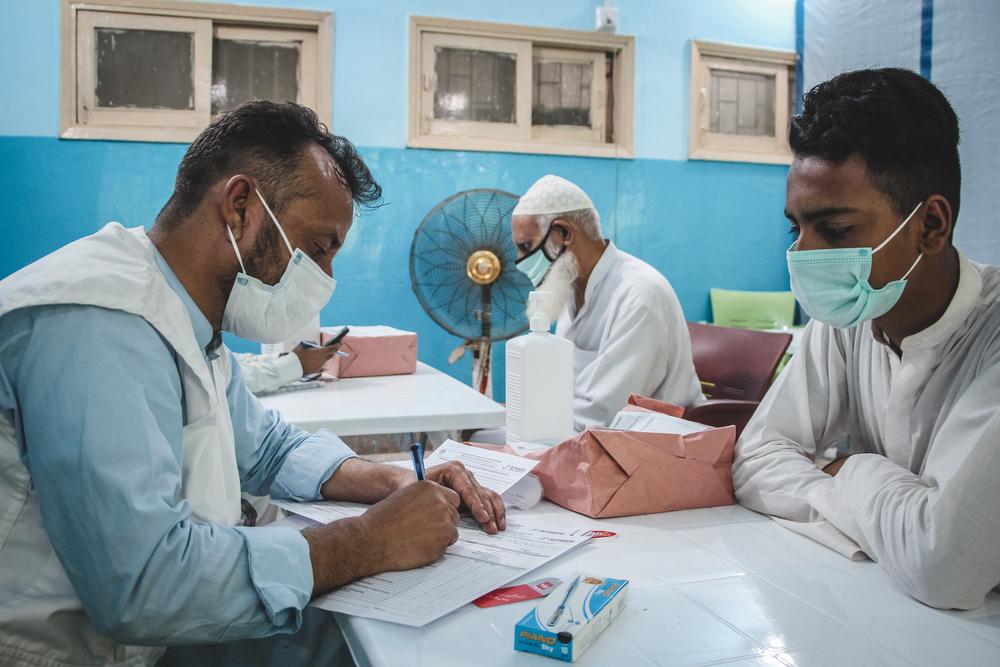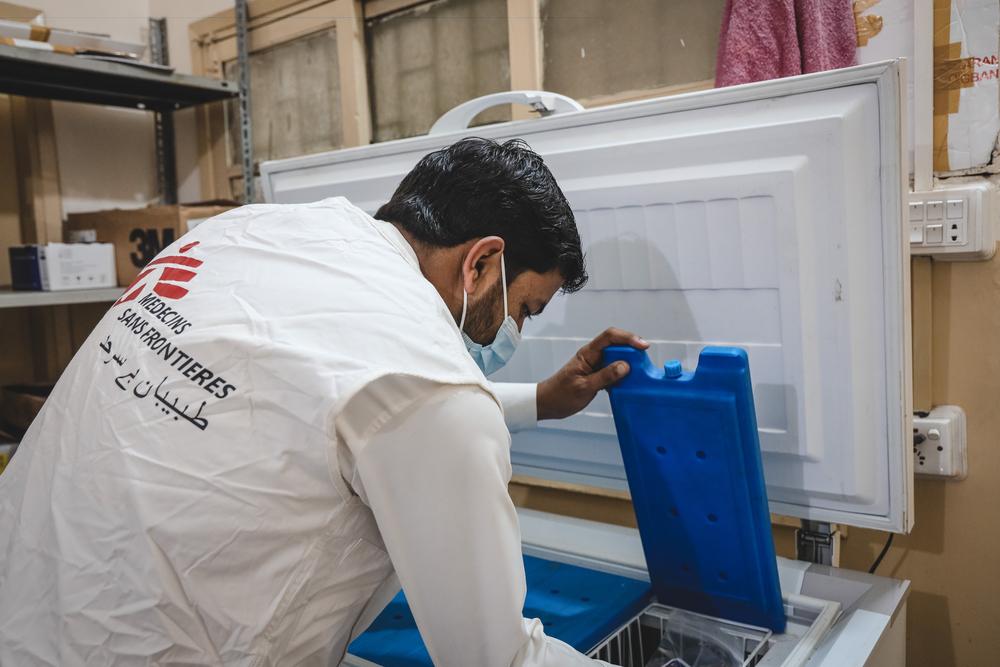Pakistan: Supporting COVID-19 vaccination activities in Karachi

Patients waiting to get vaccinated against COVID-19 at Doctors Without Borders' mobile clinic in Machar Colony, Karachi. Pakistan, 2021. © Zahra Shoukat/MSF
The neighbourhood is an industrial zone, with workers flooding in during the day. White dust hangs in the air, dancing on the vibrations from the heavy machinery, and alongside the frenzy of activity are the families who make their home here. Doctors Without Borders wants to reach both groups of people, to encourage them to get vaccinated against COVID-19.
At the moment between 80 to 100 people are coming per day to be vaccinated. Patients climb the stairs to the first floor and are directed by a crowd controller in an Doctors Without Borders vest either to a line of wooden benches under the window or down a corridor to the right – men and women from this conservative neighbourhood are seen in separate areas.

A Doctors Without Borders doctor taking the medical history of someone coming for their COVID-19 vaccination. They check if he has any symptoms of COVID, or is currently taking any medication. Pakistan, 2021. © Pirah Qasi/MS
Their visit starts by completing a medical history form before vital signs are checked and any possible symptoms of COVID-19 are assessed. From there people are directed to a booth, clearly marked with the name of the vaccination they will receive, Pfizer, Moderna, Sinopharm, Astra Zeneca etc. And then chairs welcome them for the required 30-minute post-vaccination wait; not as relaxing as they may think as small children tear around the feet of the adults, playing catch.
Dr Sara waits at her desk and watches as people pass the different stages, ready to intervene should there be a symptom that needs checking, a query about a medical history or an allergic reaction to the vaccine. Muhammad Ashraf is at the vaccination centre for his second dose and explains, “Recently COVID-19 has been spreading a lot in this area so I decided to get the vaccination. I have completed my doses today and next I will bring my family here.”
The women’s area is quieter, calmer. A patient dressed in black and gold is having her blood pressure taken, the pink headscarf of the medic glowing under the artificial light. Other women wait outside, under whirring fans, the warm air blowing down the corridor turning it into a wind tunnel. So far, the project has seen far fewer women than men coming for COVID-19 vaccination, but the female Doctors Without Borders health promoters are trying to change that. They move amongst the women talking to them about their fears and concerns, and answering questions about side effects or how to protect the rest of the family from the virus.
Many people are still scared of the COVID-19 vaccination, and some think that they will die two years after having it. We try and reassure them that this will not happen and explain how the vaccine works and what the benefits are.Alina Erum, Health Promoter
At the back, tucked away from all the activity is the nerve centre of the vaccination activity – the cold storage. This is where the vaccines are kept at the required temperature and is a small room filled with fridges and freezers and blue cold boxes. Sitting amongst them is an Doctors Without Borders staff member with his laptop. It is his job to ensure things don’t overheat or freeze, and his team have worked closely with the Ministry of Health staff to ensure that once they leave the cold chain for vaccinations will remain in place.
It’s not just COVID-19 vaccinations that require being kept at a specific temperature, but vital childhood vaccinations also have strict requirements. The vaccines stored here feed the project next door but also Doctors Without Borders' COVID-19 mobile vaccination clinic in Machar Colony, an informal settlement elsewhere in Karachi, an activity that sees about 50 people per day.

Zahid Iqbal manages the temperature of the COVID-19 vaccination cold chain at the Sher Shah rural health centre, Karachi. Pakistan, 2021. © Zahra Shoukat/MSF
Leaving the area, the cars on the main road rumble past a line of high walls over which peek blue and white signs with words such as canteen. These are the factories, where between 2,000 and 3,000 employees come every day. These men and their families are who the project want to encourage to come.
“This area has a population that ranges from between 96,000 to almost 120,000, so there are so many more people we can reach,” says Raja Zahoor, the deputy Doctors Without Borders project coordinator. Whilst Pakistan is just coming out of its fourth wave of COVID, there is no doubt it will rear its head again in a few months.